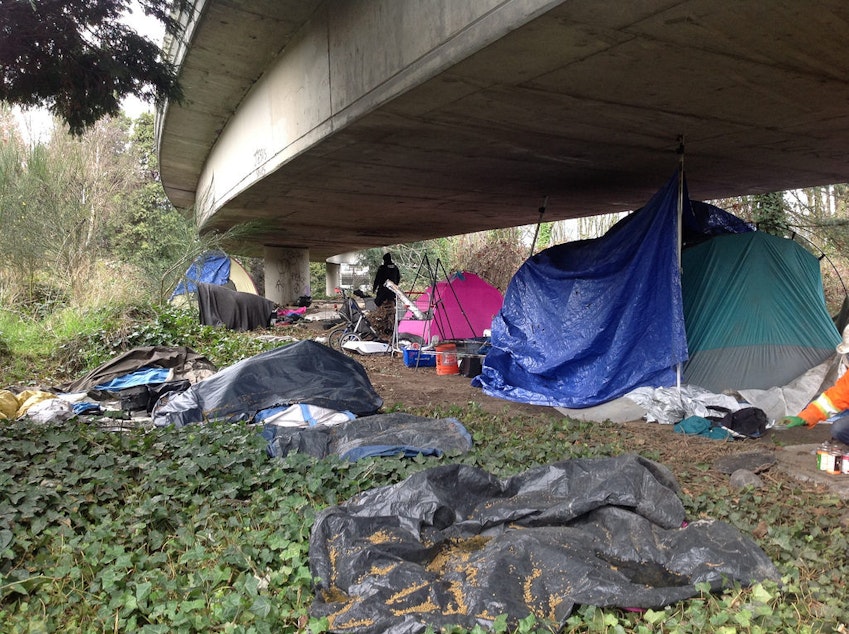Homelessness keeps rising in Seattle and King County

The numbers from this year's homeless count tell a sad but familiar story.
The number of people living on the streets in Seattle and King County has grown yet again over the past year.
On a single night in January, when the count took place, 11,643 people were homeless. Of that number, 5,485 of them were unsheltered, sleeping in tents, vehicles, parks and on the streets.
This year’s data show nearly 1,000 more people living unsheltered compared to last year, a big jump.
But officials warn the increase could be due, in part, to a new counting method. This year, volunteers were paired with guides who had experienced homelessness, they had experts to help tell if people were sleeping in vehicles, and they went to more areas than have traditionally been covered.
Sponsored
Just over 1,000 homeless people were also surveyed to get a more detailed picture of who is homeless and why.
The results confirm things officials have known for some time.
People of color are still disproportionately represented in the homeless community, with the largest disparities in the African American community.
Nearly a third of the homeless population is African American, but African Americans make up only 6 percent of the general population in King County.
Most homeless people in the county are our neighbors, they’re not migrating here to access services. The report shows that 77 percent of survey respondents were living in King County at the time they lost their housing.
Sponsored
And how did they lose that housing? Loss of a job, issues with drugs or alcohol, and eviction were all common reasons.
Once someone is on the street, it can be hard to get out. Nearly 3,000 people were counted as chronically homeless in King County, meaning they’ve been without a home for a year or more, and are living with a disabling condition.
About half of the people surveyed were living with at least one disabling condition, including mental health conditions, abuse of drugs or alcohol, and Post Traumatic Stress Disorder.
So what’s the solution? Housing. The vast majority of people said they would move in to safe and affordable housing if it were available to them.
These results are a reminder of a growing problem, one that Seattle Mayor Ed Murray is convinced the region will not be able to fix alone.
Sponsored
“Not just our state, but the whole west coast, is seeing a significant increase. Folks are being evicted, there's a housing affordability problem, we're not treating people for addiction and mental health. Unless we're willing to step in in a big way, we are not going to be able to get those numbers to start to change," Murray said.
The report shows more than two thirds of the homeless population is in Seattle.
The city is in the process of re-vamping its services system with a greater focus on getting people into permanent housing.
And, despite some concern about the shift away from transitional housing, there have been some successes both within the city and across the county.
The number of homeless families living on the streets has decreased significantly. And 7,500 households were moved into permanent housing across the county last year.
Sponsored
But officials still can't stem the flow. Adrienne Quinn, director of King County Department of Community and Human Services, said 40 percent of the people counted this year were newly homeless.
"As fast as we're getting people out, there are more people coming in. Recently we looked at our veterans data, we found that we were housing about 40 veterans a month as a community but we were having about 60 veterans becoming homeless every month," Quinn said.
This is no surprise to Zane Spencer. He holds a cardboard sign at the intersection between South Spokane Street and First Avenue, beseeching drivers who stop at the light to help him out.
Spencer said he sees the number of people on the street rising.
On the top of his wish list is more help for homeless people, like him, who want to find work. He said it’s tough right now.
Sponsored
“It’s really hard to do without an address,” Spencer said.
And it’s hard, he said, to come out and ask perfect strangers to help you.
“You kind of have to give up your dignity."
